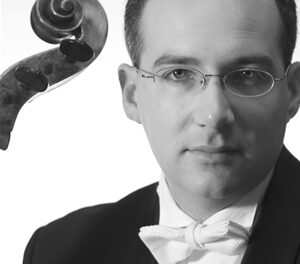There’s nothing like opening night at the theater, and the management of PlayMakers Repertory Company went all out to celebrate the official opening of its first major production of the year, Opus, by Michael Hollinger. Tuxedo’d gents and women in elegant evening gowns glided in from the relentless rain into the Paul Green Theatre on the University of North Carolina at Chapel Hill campus to see this remarkable and candid glimpse into the creative process.
Opus is setting up shop in Chapel Hill until October 11, 2009, after successful runs in Philadelphia, Pittsburgh and New York City. The tagline used in publicity and even the program booklet itself is “sex, drugs and chamber music.” That promise does not disappoint, but there is much more to this voyeuristic, but quite realistic examination of the lives of five members of a string quartet (yes, five) and the life of the quartet as its own entity. One of the great, and unfortunately unique, aspects of this production is the absolute authenticity of the string playing musical references and its ability to present this in such a way that musicians in the know don’t cringe and the general public is still thoroughly entertained. For much of that we have Richard Luby, Professor of violin at UNC Chapel Hill, to thank for his critical role as Music Consultant for Opus.
There are several subplots but the main thrust of the conflict has to do with the chemically and psychologically unstableDorian, the original violist of the quartet played with great passion by Ray Dooley. Although he is considered by all members of the group to be the finest musician, and actually should be the first violinist, he is fired and replaced by Grace (Marianne Miller) a young woman who can’t decide on a career as a member of a string quartet or as a violist in an orchestra.
Further complicating matters is the dysfunctional relationship between first violinist Elliot (Scott Ripley) and the fired Dorian; the health problems of cellist Carl (Jimmy Kieffer), whose cancer has reappeared; and whether or not second violinist Alan (Jeffrey Blair Cornell) is having an affair with the much younger Grace. I hesitate to divulge more for fear of spoiling the experience; but suffice it to say that there are no moments that drag, and the story is always engaging and entertaining.
What we have here is basically a Jerry Springer-like glimpse into the life of the Lazara Quartet, on the eve of their performance at the White House. Playwright Michael Hollinger shows his unerring familiarity with the sometimes torturous process of creating great music among four very imperfect human beings. There is one scene where the seemingly insolvable conflict of whether to stick strictly to the composer’s markings vs. reasonably informed interpretation is decided by a coin toss!
Hollinger has a great ear for the inner language of music and a remarkable ability to convey subtle and very real musical concepts to a general audience. But this is not all angst and screaming – Hollinger has written a script that is quite funny and at times propels the story along like the best of Neil Simon. The direction by Brendon Fox is sharp and effective, and he utilizes this wonderful venue to its full potential, supported by great movement, lighting and sound designers.
Something to note is that none of the five actors are musicians, but unlike even some big money major Hollywood movies, they really act in a quite credible way of how a string player looks while playing. It is obvious that they spent a great deal of time working on the bowing in the several scenes where the quartet acts out playing (to canned recordings by The Vertical String Quartet). While they did not even attempt to portray the left-hand fingering, the bowing simulation was perhaps the best I’ve ever seen.
During the production each of the five actors had an opportunity for an extended monologue and these turned out to be some of the most poetic and emotional moments of the play. But the best was saved for last as Jeffrey Cornell, playing second violinist Alan, ended the evening with a lump-in-your-throat moment that explored the mystery and power of music.
The final scene took place in a backstage room after playing for the President, and this is where all five players were present and everything exploded, or imploded. The final action was something so horribly unimaginable that the audience gasped. Despite this, and all of the childish and hurtful behavior, Alan delivered a powerful and moving fantasy on life, death and music while the strains of Beethoven’s Opus 131 quartet, itself a character in the play, dissipated into the ether.











